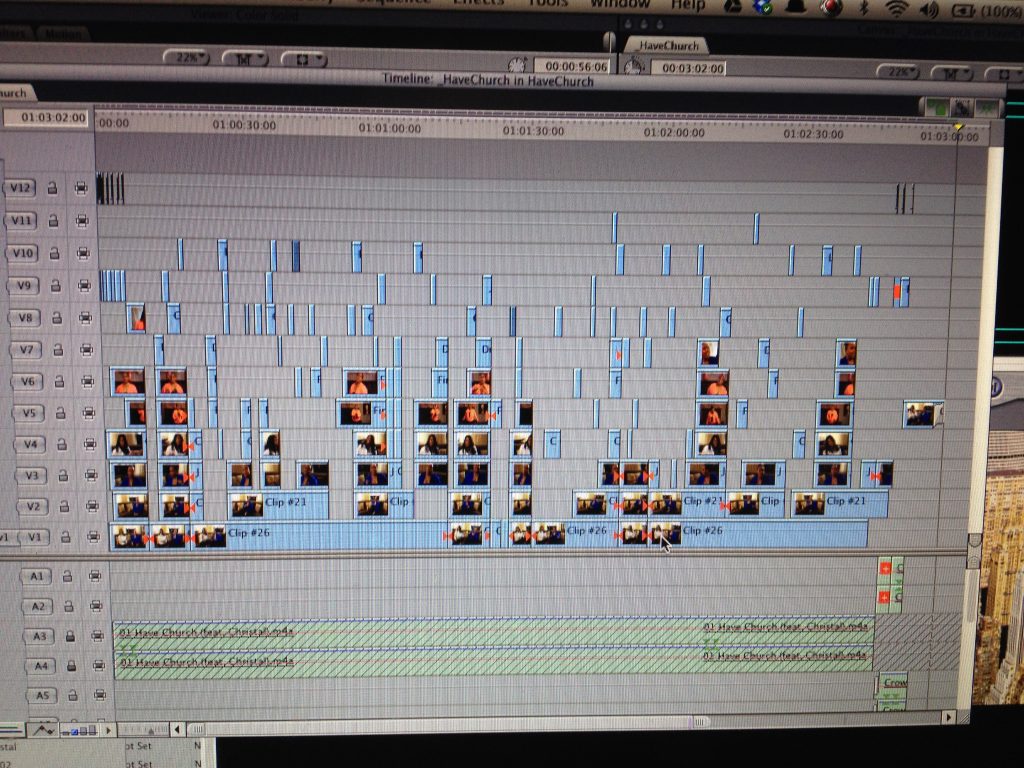
How to Get a Job in “The Industry”
The most common question film professionals get is, somewhat surprisingly, the hardest to answer. People who ask, “How do I get into the film industry?” are often looking for that magic bullet, that secret door, or that first step on the career escalator into the mythical film industry. Implied in the question is that there’s one thing you can do to get your career moving. That there’s a set-it-and-forget-it option.
But working professionals–the people who actually get paid to make film, television, and video–almost always answer somewhat unsatisfactorily. It’s not our fault, though, because there is no simple answer. Honestly, most of us don’t actually know how we broke into the industry ourselves. That leaves us giving starry-eyed young filmmakers trite answers like, “luck,” “good timing,” and “hard work,” and promulgating the myth that getting a job is like winning the lottery and one day you’ll just be there.
But what those asking and those answering can’t quickly discuss is just how big and complicated of a question it is. That’s because ‘the industry’ is huge, means different things to different people (like the term ‘producer’), and is an ever-changing blob of art, business, and trends.
The answer is both simple and complex: everyone does it differently, and most of us have no idea how we did it. That’s never a satisfying answer, but honestly there is no satisfying answer. At least, not a simple one…

What Exactly is ‘The Industry’?
When someone asks how to get a job in the industry, they can mean many different things. “The Industry” is shorthand for “the film, television, documentary, video, advertising, production, entertainment, or commercial industry.” It’s a catch-all term, like how SUV is a specific type of vehicle, but it’s also pretty broad.
Usually people are asking how to get paid to be a “creative” or “above the line” employee at a production company or agency that makes videos, commercials, branded content, television shows, or even films. This applies to jobs like Producer, Director, Art Director, Director of Photography (or Videographer), Editor, Motion Graph Artist, or a content creator of some kind. In other words, they’re asking how to get a job working for an employer or company of sorts, but not necessarily big-budget movies.
Another way to interpret ‘the industry’ is the Hollywood-style Film Industry. This means getting jobs on major motion pictures and includes jobs like PA and other intro jobs, or skilled but not necessarily ‘creative’ positions like grip, gaffer, assistant camera, etc. (yes, all of those folks are creative in their own right, but for the sake of this article they’re not what most youngsters are asking about). There are loads of resources out in the ether about how do this, so I won’t focus on it much. Check out the Anonymous PA Blog for more Hollywood-style gig advice.
Finally, when people ask how to get a job in the industry, they may simply be thinking of freelance gigs of any kind. They just want producers to hire them for local projects!
This article applies mostly to the more company-based side of the film and video industry, and how to get jobs and gigs in your area.
Understanding the Hard Truths
One of the biggest differences between the film industry and most other careers is there’s no clear corporate ladder to climb, no steps to follow. So anyone can get into it at any time regardless of education, experience, age, gender, race, or even skill level. You don’t need any pedigree or expensive program certificate.
But it’s also true no one is going to pay you to just step into a project and produce it if you have no experience. It’s a catch-22; you can’t get a job without experience, and can’t get experience without a job.
Luckily, there are some things you can do to hack the experience-loop and start forging your own path towards what you want.
And that’s the first step: figure out what you want to do. “I want to make movies” is not a serious answer. It’s too broad. When someone asks what you want to do, there’s an expectation you’ve narrowed your sights at least a little bit. If you don’t know yet, do a little homework to figure it out. Learn to be specific and realistic about what you want, what you’re good at, what your passions are, and what your skills are (or could be).
Knowing you want to be something specific like an editor, or a line producer, or a motion graphics artist helps you focus your job search efforts.
And it will be a lot of effort. The film industry is the most competitive in the world, and is constantly changing. It is an absolute struggle for everyone, and you should be very realistic about how much rejection and difficulty you can handle. If you don’t love making films, you’ll never want to keep struggling. Instead, get out now, get a degree in finance, and work at a bank.
Also, be prepared to be ignored. One of the hardest truths about the job search is just how many people want to do this and just how many job applications a given producer will receive. An employer who posts a job opening in the film industry can receive thousands of applications. In all likelihood they didn’t even look at your resume or reel for more than 10 seconds, if at all.
But if you’re determined, passionate, smart, cunning, willing to suffer, and just deluded enough to still want to work in the production industry, here are some ways to do it.
The Steps of the Corporate Ladder
You probably want to know where to find these jobs I keep talking about, right? Well, to get into the film and video industry with relatively no experience, you should do a few things before you even go looking for jobs:

- Know what you want to do (this can change, but you’ve got to aim at something). Research as much as you can and ask how others have gotten into that job. Learn any terminology you can, and be generally well-informed.
- Possess or develop the skillset you’ll need. For editors this means learning how to edit really well, learning not just software but techniques, and potentially learning motion graphics. For producers and/or directors, this means studying and practicing everything from budgeting to blocking, camera moves to corporate networking events. When you apply to a job, be sure you can actually do it.
- Do your research. Learn everything you can about your particular job, and current industry trends. Youtube is free. Use it to answer any questions or gain “how to” knowledge. These days there’s no excuse for not knowing something that’s easily researched in 5 minutes.
- Make sure your resume looks the way it should. This isn’t a corporate job, and resumes can look very different than what they teach you in high school.
- In addition to a resume, in this world you need to show how good you are at the job you’re seeking. Create a demo reel, portfolio, and website.
- Get some experience. Work on projects, even if they’re just for practice. Edit commercials using stock footage. Direct short films with your friends. Animate your local coffee shop’s logo. Make a commercial for a brand you love. You don’t have to get paid to hone your skills, your payment right now is building experience and visual proof that you can do the thing you say you can do. Do whatever you have to do to create a body of work to show off.
- Create your own work, even if no one is paying you for it.
- Always be working on a project or honing your skills. Job hunting is like dating; you’re much more attractive if you don’t look like you need the attention.
- Get yourself out there. It’s a “who you know” business, so get to know people who do what you want to do. This includes networking events, but also personal projects and getting coffee or beers with folks.
- Be ready to strike when there’s an opportunity. The industry moves very fast, so you should always have a Resume/Portfolio/Bio/Website ready to go in 5 minutes. Sometimes really competitive jobs pop up quickly and the hiring manager looks at resumes as they come in and grabs the first one they see that looks like a good match. Be early to apply.
- Look and act like a professional. You don’t have to dress a certain way, but look like you have your professional life together when someone looks you up on LinkedIn or Facebook. If you want to be a photographer, your Instagram should have good photos on it, for instance.
- Keep up with your online credits, particularly IMDB and other industry-related websites.
- Have an “elevator pitch” for yourself when someone asks what you want to do. This is one or two sentences that say what you’re good at and what you’re trying to do in the future.
- Be persistent, but don’t repeat mistakes. Make sure you’re learning from your past, learning from failures, and not assuming it’s the employers who just don’t recognize your obvious genius. If you’re getting rejected or ignored a lot, try to figure out why. Is your resume formatting wrong? Is your website unprofessional? Are your skills not up to par?
- There’s no shame in learning that filmmaking isn’t for you; it’s really, really hard. Only about 15% of people who graduate with film-like degrees are still in a media-related field 3 years after graduating.
Building Your Resume
One of the most unsung differences between the film industry and most other jobs is how resumes are formatted and presented. Since this is a visual medium and most professionals have had at least some freelance experience not considered a ‘typical’ job, our resumes can look quite different.
And to top that off, each job within the video industry will have different expectations for how your resume should look. For example, a graphic designer’s resume will look much different than a corporate producer’s resume, and that will differ from a freelance DP’s resume.

In general, there are 4 types of resumes you can choose from.
- Professional Experience Resume
- Credits Resume
- Hybrid Resume
- Infographic Resume
Create and use a resume which will work best for your career path. To know what’s best for you, research successful resumes by simply searching for images or templates of resumes for your job title. Understand the company culture and position you’re applying to. Some may be more open to unique resumes, some may prefer traditional formatting.
In addition to your format, keep the content of your resume up to snuff. No misspellings or boring, repeated phrases, make sure to have your contact information visible, etc. Check out this article to see some in-depth tips about how to build a better resume.
And always, always, ALWAYS export your resume to a PDF format, NOT a Word, OpenOffice, or Google document. PDF is the only universal document format.
Portfolio / Website / Reel:
Your reel and portfolio is, honestly, more important than your resume. That’s because video is such a visual medium, people want to see your work, not just hear about what you did. And you can’t expect employers to have seen the shows or programs you’ve worked on in the past; you have to show them.
Most video pros, especially Editors, Directors, DPs, and Graphic Artists, have a website and demo reel at a minimum.

Websites help introduce you and your skills, show your work off, and give you an appearance of professionalism. There are tons of free options for websites, so in today’s world there’s absolutely no excuse not to have at least a basic website.
Demo reels are important for showing off your work, and a complete portfolio is debatably even more impressive.
For many positions it may not make sense for you to have a reel because you don’t directly create the visuals, such as crew positions or various producer positions. But the truth is, many production companies these days expect you to have as many creative skills as possible. So if you’re applying to a job that would require creating work, be sure you have some work to show off.
Where to Find the Jobs
Now that you’ve gotten yourself looking and feeling good (professionally-speaking), it’s time to actually start looking for jobs. And that, like everything else in this industry, isn’t as easy as you might think.

Film and video positions aren’t like most jobs where employers post a job description on indeed.com or whatever and you can apply, get an interview, and get hired. There are video jobs out there like that, such as big, traditional companies that don’t primarily create video, but are looking to add to their in-house video team. But usually production companies will only post a job to “see who’s out there,” or because they’re required to by some contract or fair employment law. These guys usually already have someone in mind for the spot. Sometimes employers are just collecting resumes and reels for future opportunities.
The truth is, most production companies hire based on recommendations from other folks they know or people they’ve worked with before, and only look at online applicants when they’ve exhausted their professional network.
So there’s a HUGE need to understand, grow, and use your own network.
This doesn’t mean merely getting drunk at a networking event once a year and giving everyone a business card. Consider your “network” your group of “film friends;” people you know and who know you and your work. When people talk about “networking” in the film industry, they really mean getting to know people with the same interests and goals.
To find jobs and grow your network, there are millions of ways to do it, and everyone finds their own way. But here are a few resources you can check out for job listings, crew, or networking (in no particular order).
- Work on free gigs. Working on free projects is a hotly debated topic, but my experience has generally been good. If you can afford to work on a free project with reputable filmmakers, I recommend it. I DON’T recommend wasting your time with diva-like wanna-be’s or projects that are well below your skillset or don’t have anyone you could learn from. It’s hard to tell the difference at first, but after a couple experiences you learn to spot good opportunities and avoid bad ones. And don’t get me wrong: there’s nothing wrong with ending up on a horrible project now and then; we’ve all done it and it’s a badge of honor. But recognize when something isn’t as professional as you want, and why, and you’ll start to meet people who can find you bigger and better opportunities.
- Internships. Many bigger companies (think Disney, HBO, Discovery, or CBS) have internships, mentor programs, or fellowships you can get by applying. These are very competitive but will kick-start your career. Smaller, local production companies likely take on interns as well, but be aware of unpaid “internships” that require you to do professional work without getting paid. There’s a fine line between a learning opportunity and predatory employment behavior. Make sure anyone you’re interning for has a legitimate company reputation.
- Work on paid gigs. Every job is an interview for the next one, so get to know folks when you’re on a shoot, show them (don’t tell them) how good you are, and follow up with people who offer to connect with you.
- Work on your own projects. A good way to learn who is worth working with in town is to, y’know, work with them.
- Check out job postings on all the typical sites like Indeed, Monster, LinkedIn, etc. Try to familiarize yourself with the companies and the players in your area, and who is more traditional and who is more artsy. Just don’t hold your breath for an Indeed job.
- Check out your local film office and get on any job alerts, (free) crew databases, or newsletters. These typically don’t have a lot of job opportunities, but are great for getting information and learning who the players are in your local industry. Beware of local “crew databases” that charge fees. It shouldn’t cost you money to get a job.
- Join local professional networks or organizations. Just about every town has several of these, such as production associations, media networking clubs, advertising professional networks, local production union chapters, or even local film schools with newsletters.
- Search online for local production companies, advertising or creative agencies, or media creators and see if you can get their newsletters and attend their industry events.
- Get familiar with the kind of work local companies do by Googling them. Most production companies list job openings on their own website. But don’t cold-email them looking for work unless you know someone there or are applying to a job posting.
- Try to go to any industry events you can to network. Networking doesn’t mean trying to get a job, it just means meeting people and asking them what they do. Be interested in them, and often they’ll be interested in you.
- Go to film festivals and award events, too, particularly big or medium-sized local festivals.
- There are industry-specific resources, too. Some are paid, some are free, so do a little research. I recommend making sure a service will yield real results before paying for it.
- even Craigslist (mostly crap, but every now and then…)
- Check out any industry-related Meetup or Facebook groups. Lots of these groups will post jobs, gigs, and networking opportunities. It’s also good to be a member of the actual production community anyway.
- Get in touch with people, and get back to people. If an industry pro is willing to take the time to respond to your emails or inquiries, make use of that. Ask them for advice. Take them out to coffee. Get to know their story. Most industry pros know how important networking is, and are more than happy to make connections if they think you’re serious about getting into the industry.
- Finally, and importantly, pay it forward. People get jobs because they help other people get jobs. If you see an opportunity not right for you, but maybe good for a friend, recommend them. Remember: you’re trying to make friends, and friends hook each other up when they can. The whole film industry is built on that philosophy.
Keep at it
I know how difficult it is to get a video or film job right now. I also know how creative and imaginative you are. If you stick with it, learn from your mistakes, lean on your network, and take advantage of opportunities you find, you will be able to navigate the film industry.
If you’re stuck at home right now due to COVID, don’t lose heart. As you’re job searching, create some of your own work and bone up on your skills, because a huge hiring frenzy is just around the corner. Be ready.
And that’s where I’d like to leave it. There’s always hope right around the corner. Good luck.


Pingback: How to Make a Film Resume | Shooting Richard | Video Production
May 7, 2021 3:55 pm